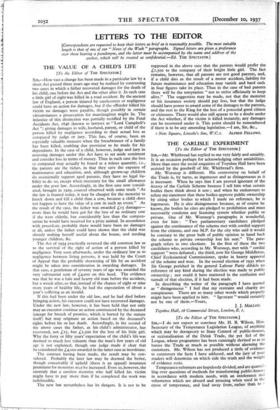THE CARLISLE EXPERIMENT
[To the Editor of THE SPECTATOR.]
Snt,—Mr. Whitbread has replied to me very fairly and amiably. It is an occasion perhaps for acknowledging other amiabilities. More than once the social enquiries of Toynbee Hall have been assisted by the goodwill of Mr. Whitbread's firm.
Mr. Worsnop is different. His controversy on behalf of the Trade is, by turns, as ingenuous and as disingenuous as it is incessant. When he says that I am proved ignorant of the history of the Carlisle Scheme because I tell him what certain bodies there think about it now ; and when he endeavours to refute my statement that these bodies approve public ownership by citing other bodies to which I made no reference, he is ingenuous. He is also disingenuous because, as of course he knows, the bodies he cites are pledged to prohibition and must necessarily condemn any licensing system whether public or private. One of Mr. Worsnop's paragraphs is wonderful, even for him : "Two parliamentary candidates pledged against the continuance of the scheme met with cordial support from the citizens, and one M.P. for the city who said it would be contrary to the great bulk of public opinion to hand back the scheme to private ownership lost his seat." The para- graph refers to two elections. In the first of these the two candidates who, according to Mr. Worsnop, met with "cordial support "were defeated ; the third, now Sir George Middleton, Chief Ecclesiastical Commissioner, spoke in hearty approval of the scheme and won. In the second election of 1931 when Sir George perished in the general Labour Party deba'cle no reference of any kind during the election was made to public ownership ; nor could it have mattered- in the confusion and tumult of that election, if it had been made.
In describing the writer of the paragraph I have quoted as " disingenuous " I feel that my restraint and charity are conspicuous. There are so many other words which properly might have been applied to him. "Ignorant "would certainly not be one of them.—Yours,






















































 Previous page
Previous page